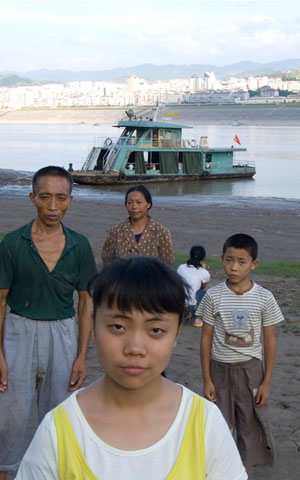 In 2011 the Three Gorges Dam will become fully operational and will be the largest hydro-electric power station on Earth. It will also have displaced one and a half million people whose homes are now or will be underwater as the dammed-up Yangtze River floods. As the water creeps higher, luxury boats catering to foreign tourists go up and down the river, giving ‘good-bye tours’ of the land that will soon be submerged. Working on one of these boats is 16 year old Yu Shui, whose family lives in an improvised shack that is about to be obliterated by the dam. Canadian Chinese filmmaker Yung Chang uses her story, and the story of her family, as a springboard to look at the way that China’s continuing modernization and economic powering up is colliding head on with the poor in Up The Yangtze.
In 2011 the Three Gorges Dam will become fully operational and will be the largest hydro-electric power station on Earth. It will also have displaced one and a half million people whose homes are now or will be underwater as the dammed-up Yangtze River floods. As the water creeps higher, luxury boats catering to foreign tourists go up and down the river, giving ‘good-bye tours’ of the land that will soon be submerged. Working on one of these boats is 16 year old Yu Shui, whose family lives in an improvised shack that is about to be obliterated by the dam. Canadian Chinese filmmaker Yung Chang uses her story, and the story of her family, as a springboard to look at the way that China’s continuing modernization and economic powering up is colliding head on with the poor in Up The Yangtze.
Chang lets his camera soak in the gorgeous mountains that line the Yangtze, and he even manages to make the Yu hovel look warm and invited – despite not having complete walls or any sort of electricity. Up the Yangtze is an often beautiful film, occasionally too much so; a shot where Shui is packing her few belongings into a plastic grocery bag before leaving her family to work on the boat is framed so nicely, and features such a perfect emotional moment, that it’s hard not to wonder if it was staged, or at least encouraged.
Despite a couple of moments that feel too good or too narrative to be true, Chang’s camera captures many other moments that are weighted with truth and honesty. Life on the cruise boat is surreal, as the Chinese employees take on American names and try their best to please the tourists, who come across as slightly clueless and silly. At one point an expedition group in a small boat is singing My Bonnie as they paddle up the magnificent Yangtze, a scene that really illustrates the disconnect between tourists and the places they visit. The film bounces between moments that are hilarious and ones that are devastating, which helps keep the whole documentary from feeling like a polemic, or a sentimental wallow.
At the heart of the film is the question of the effect that modernity and a booming economy will have on China. It’s hard to deny that Shiu’s life on the boat – where she gets fed meat every day – is not in some ways better than living in a shack on a riverbank. But watching her family move their belongings, one piece at a time, on their backs to a new apartment where they won’t be able to grow the food they need to survive and cannot afford to buy, your heart breaks at the injustice. And while the film is specifically about the China, the issue of modernization leaving behind the poor is one that’s facing every nation today.
Chang opens up his focus at times, with varying levels of success. Another employee on the boat, the cocky 19 year old Chen Bo Yu, is set up as a counterpoint to Shiu, as he comes from an urban family with some money, but as a character he never comes alive. He’s in the film much less than Shiu or her tragically impoverished family, and on some levels I wish Chang had left him out. On the other hand another scene visits a soon-to-be flooded town that was the birthplace of a heroic Communist general who fought alongside Mao; there the tears of a shopkeeper relating how he and his family were beaten and dragged out of their home during forced relocation reminds us that while China is enjoying a capitalist economic renaissance, the nation is still repressive at best.